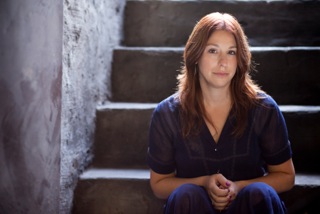One of my favorite parts of Book Expo is always the opportunity to talk with the editors and publicists and other booth staff at some smaller presses. Last year,
I walked away with an armload of new galleys from Tin House, and none disappointed. This year, I was excited to hear what three small publishers (including Tin House, of course), have on offer:
Graywolf Press
Graywolf's catalog is small but charming, with literary fiction, non-fiction and poetry offerings that are always worth browsing. Some highlights for me included:
Duplex, by Kathryn Davis (October): Promising interconnected plot lines, a "traditional love story tucked inside an adult fairy tale" and stunning writing.
On Immunity, by Eula Bliss (September): "A powerful examination of what vaccines mean for our children, our communities, and the world by the winner of the National Book Critics Award."
See You in Paradise, by J. Robert Lennon (November): A short story collection from an author Ann Patchett calls "a writer with enough electricity to light up the country."
Recently released titles that also caught my eye:
Song of the Shank by Jeffery Renard Allen;
Karate Chop: Stories by Dorthe Nors (translated from the Danish by Martin Aitken);
Woke Up Lonely by Fiona Maazel
Melville House
In addition to having an excellent blog, Melville House offers a quirky list of delightful titles, ranging from short story collections to the beautiful titles in the Neversink Library and Art of the Novella series.
Wittgenstein Jr, by Lars Iyer (September): A humorous coming-of-age story (I've got a soft spot for coming-of-age stories).
GB84, by David Peace (November): Peace's name graces no less than three pages in Melville House's 2014 catalog: two for his soccer football novels,
The Damned Utd and
Red or Dead, and one for
GB84, a novel of the British coal miner's strike of 1984. Based on what I heard Peace reading at BEA, I have a feeling this man could write about anything and I'd be interested.
The Science Delusion: Asking the Big Questions in a Culture of Easy Answers, by Curtis White (August): The subtitle on this kind of says it all, but what's also worth noting is the blurb: "'Splendidly cranky.' --Molly Ivins" (The August edition is an updated paperback release of a 2013 hardcover.)
Recently released titles that also caught my eye:
Red or Dead by David Peace (I heard him read from this for a bit, and it was
outstanding);
The Weirdness by Jeremy P. Bushnell;
A Highly Unlikely Scenario by Rachel Cantor (I've read this one and highly recommend).
Tin House Books
Tin House was a favorite stop in 2013, thanks to a tip from Catherine at Gilmore Guide to Books, and this year's catalog did not disappoint. (It didn't hurt that they threw a birthday party for Walt Whitman in their booth, either, complete with cake.)
The Other Side: A Memoir, by Lacy M. Johnson (July): Lacy Johnson was held prisoner by her ex-boyfriend in a sound-proofed room in a basement. Her memoir "weaves together a richly personal narrative with police reports, psychological evaluations and neurobiological investigations." This looks intense, but if I learned anything from
reading Roxane Gay's An Untamed State, it's that sometimes intense is necessary--and worth it.
The Wilds, by Julia Elliott (October): When I asked the editor at the Tin House booth what one book she'd recommend from the fall list, she handed me this without hesitation. That's enough for me, but even better is the catalog description, that Elliott's "language-driven fiction uses outlandish tropes to capture poignant moments in her humble characters' lives."
The World Split Open: Great Writers on How and Why We Write, A Literary Arts Reader (November): In celebration of the 30th anniversary of Literary Arts, Tin House has compiled highlights from the series into a single volume, including entries from Margaret Atwood, Marilynne Robinson (!), E.L. Doctorow, and Ursula K. LeGuin, among many others.
Recently released titles that caught my eye: Who are we kidding, there were lots of great titles but the illustrated edition of Walt Whitman's
Song of Myself was the most impressive:
Whitman Illuminated: Song of Myself, by Walt Whitman (illustrated by Allen Crawford), on sale now: Perhaps one of the absolute prettiest books I've ever seen, and an edition that should grace the shelves of any lovers of poetry, Whitman, and/or book design.
What small press titles are you looking forward to this year?














.jpg)




















